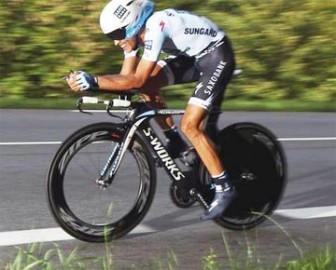(BBC) The Court of Arbitration for Sport (Cas) has banned Alberto Contador for two years for doping.
He has been stripped of his 2010 Tour de France victory and, with his suspension running until 5 August, will miss this year’s Tour and the Olympics.
The Spaniard, 29, was found guilty of doping after testing positive for clenbuterol during the 2010 Tour.
He has maintained that the failed test was a result of eating contaminated meat.
Andy Schleck of Luxembourg, who finished second to Contador in the 2010 Tour de France, is set to be elevated to champion.
Schleck said: “First of all I feel sad for Alberto. I always believed in his innocence. This is just a very sad day for cycling [but] we can finally move on.”
Under the rules of the world governing body, Union Cycliste Internationale (UCI), Contador also forfeits all his wins in 2011, which include the Giro d’Italia.
Contador’s ban is backdated from 25 January 2011, the date the Spanish Cycling Federation (REFC) initially proposed a one-year ban, which was rejected by Contador.
REFC cleared Contador the following month, but the UCI and World Anti-Doping Agency (Wada) appealed against that decision to Cas, which upheld the appeal after twice postponing the hearing.

Since Contador served five months and 19 days of a provisional suspension in 2010-11, his ban will run until 5 August this year rather than 25 January 2013.
The verdict was handed down by a three-man jury consisting of Israeli Efraim Barack, Quentin Byrne-Sutton of Switzerland and German Ulrich Haas.
A statement from Cas read: “The panel found that there were no established facts that would elevate the possibility of meat contamination to an event that could have occurred on a balance of probabilities.
“In the panel’s opinion, on the basis of the evidence adduced, the presence of clenbuterol was more likely caused by the ingestion of a contaminated food supplement.”
UCI president Pat McQuaid said: “This is a sad day for our sport. Some may think of it as a victory, but that is not at all the case.”There are no winners when it comes to the issue of doping: every case, irrespective of its characteristics, is always a case too many.”
REFC president Juan Carlos Castano said: “It’s very bad news for Spanish sport. For us this journey has ended.”
And British cyclist Mark Cavendish – the winner of the green jersey for top sprinter in the 2011 Tour de France – added on Twitter: “Regardless of the outcome for Contador, I just wish, for the sake of our sport & everyone in it, that a decision had been made sooner.
Contador is one of only five cyclists to win the three Grand Tours – the Tour de France, the Giro and the Spanish Vuelta.
A winner of the Tour in 2007 and 2009, he becomes only the second cyclist to lose his title for doping, after American Floyd Landis tested positive for testosterone in 2006.
Contador blamed steak bought from a Basque producer for his high reading of clenbuterol, a fat-burning and muscle-building supplement which is sometimes used by farmers to fatten their livestock.
In June 2011, he said: “From the beginning of the season I’ve been the rider who’s had the most doping tests, and I’ve been tested in all the races I’ve been in.
“The idea victory could be taken away if I win, I just find ridiculous.”



